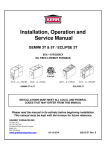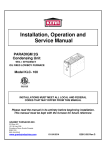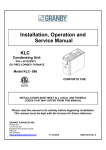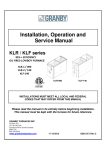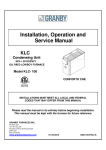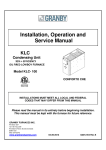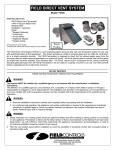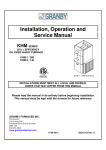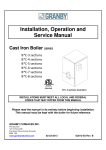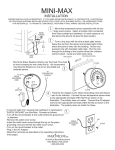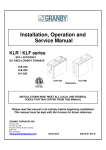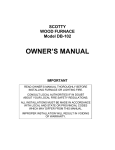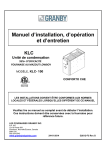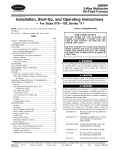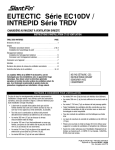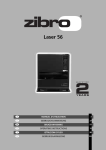Download DVS-100 - Wolseley Canada Inc
Transcript
Installation, Operation and Service Manual Direct Vent CO-AXIAL DIRECT VENT SYSTEM DVS-100 INSTALLATIONS MUST MEET ALL LOCAL AND FEDERAL CODES THAT MAY DIFFER FROM THIS MANUAL Please read the manual in its entirety before beginning installation. This manual must be kept with the direct vent system for future reference. GRANBY FURNACES INC. PO Box 637 12118 Hwy 209 Parrsboro Nova Scotia Canada B0M 1S0 902-254-2543 www.granbyindustries.com 10-25-2012 G2012-E4 Rev. C TABLE OF CONTENTS 1.0 IMPORTANT SAFETY ADVICE 2 2.0 APPROVED APPLIANCE 3 3.0 INSTALLATION REQUIREMENTS 3 4.0 CO-AXIAL VENT INSTALLATION PROCEDURE 5 5.0 INSTALLATION CONSIDERATIONS 5 6.0 DIRECT VENT RECOMMENDATIONS 6 7.0 TERMINAL INSTALLATION 6 8.0 FLUE PIPE ADAPTER INSTALLATION 9 9.0 FLUE PIPE CONNECTION 12 9.1 CONNECTION TO APPLIANCE 12 9.2 CONNECTION TO TERMINAL 12 10.0 COMBUSTION AIR PIPE INSTALLATION 13 11.0 PRESSURE SAFETY SWITCH INSTALLATION 13 12.0 PRESSURE SWITCH WIRING CONNECTION 15 12.1 KLR, KLF & KHM CONNECTION 15 12.2 CAST IRON BOILER B*C CONNECTION 15 13.0 HEATING UNIT BURNER SPECIFICATIONS 16 14.0 START-UP INFORMATION 18 14.1 START-UP PROCEDURE 18 14.2 COMBUSTION TEST 18 15.0 EXPLODED PARTS VIEW 19 1 1.0 IMPORTANT SAFETY ADVICE Please read and understand this manual before installing, operating or servicing the DVS-100 direct vent system. To ensure you have a clear understanding of the operating procedures of the DVS-100 direct vent system please take the time to read the IMPORTANT SAFETY ADVICE section of this manual. WARNINGS NEVER store combustible material around it. DO NOT attempt to start burner when excess oil has accumulated, or when unit is full of vapors. CAUTION DO NOT START THE BURNER UNTIL ALL DVS DIRECT VENT SYSTEM PARTS, ADAPTERS AND SILICONE SEALANT ARE IN PLACE. DO NOT TAMPER WITH THE APPLIANCE OR CONTROLS, CALL A QUALIFIED BURNER TECHNICIAN. IMPORTANT This manual contains instructional and operational information for the DVS-100 direct vent system. Read the instructions thoroughly before installing the DVS-100 direct vent . Consult local authorities about your local FIRE SAFETY REGULATIONS. All installations must be in accordance with local state or provincial codes. Improper installation will result in voiding of warranty. Please make sure that the DVS-100 sticker found in the installation, operation and service manual is affixed on the furnace before/after the installation of the equipment to certify installation of the DVS-100 with the appliance. If the sticker is already in place on the heating appliance, please ignore this note. 2 2.0 APPROVED APPLIANCE The DVS-100 direct vent system is approved with the following heating equipment manufactured by Granby Furnaces inc.: • • • • Warm air furnace KLR (small and large models) with input ranging from 0.55 USGPH to 1.15 USGPH. Warm air furnace KLF with input ranging from 0.75 USGPH to 1.10 USGPH. Warm air furnace KHM (small and large models) with input ranging from 0.55 USGPH to 1.15 USGPH. Cast Iron boiler model B*C with input ranging from 0.70 USGPH to 1.25 USGPH The only approved burners for the DVS-100 system are Riello BF3 and BF5 burners. BF3 burner: KLR-1 / 090 (up to 0.75 USGPH), KHM-1 / 090 (up to 0.75 USGPH) and the B*C cast iron boiler 3 sections only. BF5 burner: KLR-2 / 140 (up to 1.15 USGPH), KLF-140 (up to1.10 USGPH), KHM-2 / 140 (up to 1.15 USGPH), Cast Iron boiler B*C (4 and 5 sections). All burners are to be installed with nozzles and pump pressures as specified in this manual and on the units rating plates specific to direct vent systems. 3.0 INSTALLATION REQUIREMENTS The vent and combustion air intake must be installed in accordance to CSA B139/NFPA31 or the appliance local codes. We do not recommend enclosing flexible vent pipe, nor having the flexible vent pipe pass through interior walls, floors or ceilings. If the pipe passes through walls, floors or ceilings the methods detailed in CSA B139/NFPA31 must be followed. 3 WALL TERMINAL INSTALLATION REQUIREMENTS In CANADA Refer to the CSA B139 Code for the placement of the vent termination In UNITED STATES Refer to the NFPA31 Code for the placement of the vent termination Direct vent terminal wall clearance Outlet termination clearance above grade and roof overhang VENT TERMINATION WARNING It is the responsibility of the homeowner to ensure that the area around the vent terminal and air intake is free of snow, ice and debris. The vent terminal should be checked during heavy snowstorms to ensure proper operation. 4 4.0 CO-AXIAL VENT INSTALLATION PROCEDURE Only approved venting components shall be used. The maximum length of flue gas vent pipe and air pipe is 20’ (6 m). The vent pipe must be in one continuous piece with no joints. 5.0 1. 2. 3. 4. 5. INSTALLATION CONSIDERATIONS Place metal strapping every 36” to support vent pipe and prevent it from sagging. Minimum wall thickness is 6’’ and maximum is 14’’. This system is not designed for common venting. Use for a single appliance only. Utilize the appliance adapter test port for combustion testing. Follow national codes for the installation of DVS-100 equipment: in USA – NFPA31, in Canada – CSA B139 and local regulations. Direct vent system installation 5 6.0 DIRECT VENT RECOMMENDATIONS The following Direct Vent recommendations are based on data from the field and laboratory testing. a) The minimum inside bend radius for the vent is 12”. b) The appliance must be located within the heated space. c) The combustion air supply must not be insulated for the last 48” before the burner. d) A combustion air damper kit is recommended for areas of extreme cold (-30OC). e) Interior oil tanks are recommended. f) The oil filter must never be placed outdoors. g) The vent should be as short as possible with minimum bends. h) The vent terminal should not be placed on the building exterior side facing high prevailing winds. i) In extremely cold climates, ice may have to be removed from the terminal on a regular basis. j) Natural wood and stucco exterior building finishes may be affected by exhaust gases. 7.0 TERMINAL INSTALLATION Make sure you have all necessary components 1. 2. 3. 4. Determine the terminal location. Cut a 6 1/4“ round hole through the wall (slightly larger than the O.D. of the terminal). Remove the terminal air adapter from the termination. From the outside of the building, insert the outer section through the hole until rests against the wall. See figure 1. Wall Outer Wall Terminal Figure 1 – Terminal installation (Step 1 to 4) 6 5. Seal with a weatherproof sealant around the edge of the outer wall plate to prevent water from getting inside (figure 2). It is recommended that a 24” x 24” patio block be placed under the vent terminal in areas where vegetation may grow up around the terminal. 6. From the inside of the building, slide the inner wall plate over the outer section and secure using four (4) screws. See figure 2. Seal with Wall silicone Inner Wall Plate Exhaust Air Intake Figure 2 – Terminal installation (Step 5-6) 7. Tighten the collar around the terminal. (Figure 3) 8. Slide the terminal air adapter on the interior portion of the termination. Pay attention to align the pressure tube inside the grommet mount on the terminal air adapter. See figure 3. Pressure tube Gear Clamp Grommet Terminal Air Adapter Figure 3 – Terminal installation (Step 7-8) 7 9. Seal with aluminum duct tape the joint between the terminal air adapter and the other fixe tube of the terminal. See figure 4. Seal with tape Figure 4 – Terminal installation (Step 9) 10. Fixe the end cap plate to the end of the interior terminal using four (4) screws to secure the inner pipe of the terminal. End Cap Plate Screw (4) Figure 5 – Terminal installation (Step 10) 8 11. Seal with high temperature silicone (red) the gap between the end cap plate and the inner tube. Also, seal around the grommet and the pressure tube. Inner tube Seal with silicone high-temperature Figure 6 – Terminal installation (Step 11) 8.0 FLUE PIPE ADAPTER INSTALLATION 9 1. Pull the corrugated inner tube out of the vent pipe for easy access to insert the adapter. Vent pipe 2. Apply silicone around the corrugated end of both appliance and terminal adapters. 3. Align the flat seams at the end of both corrugated tubes and insert the adapter into the vent tube. Screw the adapter into the vent pipe with a counter clockwise motion. The adapter should be fully inserted into the inner vent tube until it’s tight. The seams of the tubes must be aligned for easy insertion. If the adapter does not completely screw into the vent pipe, unscrew it and try again as per Step #3. Note that this is a multi-start left hand thread: with one thread twice the width of the others. Therefore, care must be taken to ensure that the correct threads are engaged before tightening in a counter clockwise direction. Figure 7 – Joint Assembly ( before insertion) Figure 8 – Joint Assembly (insertion) 10 4. If the vent area requires cutting to length, a fine-toothed hacksaw can be used. Remove any burrs and flare out the end of the inner vent tube for easy installation of the adapter. Ensure that there is enough length to form large radius bends no smaller than 12” (0.3 m) in radius. 5. The vent must have 9” of clearance to combustibles within 36” of the appliance breech. The remaining section of the vent to the terminal can have a minimum of 1” of clearance to combustibles. The terminal is rated for 0 clearance to combustibles. Terminal Flexible double wall insulated flue gas pipe ready to be installed Test port Terminal Appliance adapter with test port Figure 9 – Flexible flue gas pipe 11 9.0 FLUE PIPE CONNECTION 9.1 1. 2. 3. 4. CONNECTION TO APPLIANCE Apply sealant around the appliance flue collar. An approved appliance elbow may be used. Slide the appliance adapter over the appliance flue collar. Tighten the gear clamp of the appliance adapter around the flue collar (do not over tighten). A 5” appliance elbow is available to accommodate tight flex pipe connections to the appliance where a 90 degree turn is required at the breech connection. 9.2 CONNECTION TO TERMINAL 1. Apply sealant around the termination pipe. 2. Slide the terminal adapter over the terminal flue collar. 3. Tighten the gear clamp of the termination adapter around the termination pipe (do not over tighten). 4. Install the insulation strip over the terminal adapter connection. Using aluminum duct tape, seal, each end of the insulation strip to the air adapter tee and the insulated flex pipe. A 4” terminal elbow is available to accommodate tight flex pipe connections to the terminal where a 90 degree turn is required at the termination. Figure 10 - Connection to appliance and terminal 12 10.0 COMBUSTION AIR PIPE INSTALLATION 1. Use 4” diameter vent pipe ( not included in the DVS-100 kit ) for combustion air. (The direct vent system requires additional parts. The combustion air pipe must be approved, Schedule PVC 40, PVC-SWV, SDR-21, SDR-26, Septic Sewer Pipe, ABS plastic pipe and aluminum pipe). Choice of material is up to the installer’s discretion. 2. Run from the vent terminal to the burner. 3. A reducer will be required at the burner. 4. Seal all joints with sealant and / or aluminum duct tape. Figure 11 – Combustion air pipe 11.0 PRESSURE SAFETY SWITCH INSTALLATION Oil-fired appliances installed with a direct vent system requires a pressure safety switch. A safety switch is included with the direct vent kit. It is the installer’s responsibility to install the pressure switch in accordance with the instruction provided. The pressure switch will automatically shut down the burner if vent is blocked for any reason. Once the blockage is removed, the burner will automatically restart. Pressure switch box must be installed in the vertical position on the inside wall near the terminal. Pressure switch box Terminal 13 Pressure switch connection to terminal The pressure switch must be wired in series with the thermostat and the control of the appliance. For more information, see page 15 Terminal air adapter tee Flue outlet port + Air intake port Pressure ( ) Vacuum ( -) Vacuum Pressure - V + P Port (- V) of the pressure switch must be connected to the air intake port on the terminal air adapter tee Port (+ P) of the pressure switch must be connected to the flue outlet terminal air adapter tee Note: PIPES CHECK Check flue and combustion air pipes for any leaks 14 12.0 12.1 PRESSURE SWITCH WIRING CONNECTION KLR, KLF and KHM WIRING CONNECTION Honeywell ST9103 (Fan timer control) KLR KHM KLF 12.2 CAST IRON BOILER B*C CONNECTION B*C WIRING CONNECTION Honeywell L7248 Aquastat 15 13.0 HEATING UNIT BURNER SPECIFICATIONS 1. Mount the burner to the heating unit using all four (4) mounting stubs. This will secure the burner to the heating unit providing an even seal around the burner gasket 2. The wires leading from the burner housing must be sealed with the wire seal provided. Riello BF sealed burner KHM Series specifications KHM-1 / 090 Riello Burner KHM-2 / 140 BF3 Unit Model KHM-E1-*067-03 KHM-E1-*079-03 Firing Rate (USGPH) 0.55 0.65 Input (BTU/h) 77,000 91,000 Output (BTU/h) 67,000 79,000 Nozzle 0.40 70A 0.60 70W Pump Pressure (psi) 190 145 Turbulator Setting 0 0 Air Gate Adjustment 1.75 2 BF5 KHM-E1-*091-03 KHM-E3-*109-05 KHM-E3-*127-05 KHM-E3-*139-05 0.75 105,000 91,000 0.65 70W 145 0 2.35 0.90 126,000 109,000 0.75 80W 145 0 2 1.05 147,000 126,000 0.85 70W 165 1 2.25 1.15 161,000 139,000 1.00 70W 145 2 2.25 16 KLR Series specifications KLR-1 / 090 KLR-2 / 140 BF3 BF5 Riello Burner Unit Model Firing Rate (USGPH) Input (BTU/h) Output (BTU/h) Nozzle Pump Pressure (psi) Turbulator Setting Air Gate Adjustment KLR-E1-*067-03 KLR-E1-*079-03 KLR-E1-*091-03 KLR-E3-*109-05 KLR-E3-*127-05 KLR-E3-*139-05 0.55 77,000 67,000 0.40 70A 190 0 1.75 0.65 91,000 79,000 0.60 70W 145 0 2 0.75 105,000 91,000 0.65 70W 145 0 2.35 0.90 126,000 109,000 0.75 80W 145 0 2 1.05 147,000 126,000 0.85 70W 165 1 2.25 1.15 161,000 139,000 1.00 70W 145 2 2.25 KLF Front breech specifications KLF-140 Riello Burner Unit Model Firing Rate (USGPH) Input (BTU/h) Output (BTU/h) Nozzle Pump Pressure (psi) Turbulator Setting Air Gate Adjustment BF5 KLF-E3-*093-03 KLF-E3-*102-05 KLF-E3-*119-05 KLF-E3-*132-05 0.75 105,000 93,000 0.65 70W 145 0 1.75 0.85 119,000 102,000 0.75 70W 145 0 2 1.00 140,000 119,000 0.85 70W 165 1 2.25 1.10 154,000 132,000 1.00 70W 145 2 2.25 B*C Cast Iron Boiler specifications Cast Iron Boiler Riello Burner Unit Model Firing Rate (USGPH) Input (BTU/h) Output (BTU/h) Nozzle Pump Pressure (psi) Turbulator Setting Air Gate Adjustment BF3 BF5 B*C-3 sections B*C-4 sections B*C-5 sections BF5 0.70 98,000 83,000 0.55 70B 160 2.0 4.6 1.00 140,000 121,000 0.85 60B 140 1.0 4.4 1.25 175,000 151,000 1.00 60W 156 2.0 5.6 17 14.0 START-UP INFORMATION 14.1 START-UP PROCEDURE - Prior to start up make sure the service switch is in OFF position. - Check all connections on the Direct Vent System between the terminal vent and the appliance. - Check to insure that clean quality #1 or #2 heating oil has been used to fill up your storage tank. - Open all manual shutoffs oil valves throughout the system. - Follow the burner specifications in the instruction manual of the appliance for proper setting, using accurate combustion test equipment, set the burner for proper « steady state » operation. The use of accurate instruments is necessary to achieve maximum efficiency and lowest fuels costs. 14.2 COMBUSTION TEST Important: All your tests must be done with the burner cover on 1) After a minimum of 10 minutes of burner operation, take a smoke test and adjust the burner to obtain a reading of « 1 » on the smoke scale. 2) Take a CO2 Test and note the result 3) Open the air adjustment band on the burner to reduce your CO2 lecture by 1.5%. You now have a perfect « 0 » of smoke. Relation between % of CO2 and O2 CO2 (%) O2 (%) Excess Air (%) 13.5 13.0 12.5 12.0 11.5 11.0 2.6 3.3 4.0 4.6 5.3 6.0 15.0 20.0 25.0 30.0 35.0 40.0 18 15.0 EXPLODED PARTS VIEW DVS-100 Exploded Parts View DVS-100 Part List ITEM PART NUMBER DESCRIPTION QTY 1 2 3 4 5 6 7 8 DVT-A0-0002-00 DVT-A0-0003-00 DVT-A0-0005-00 3DV-FM-KIT4-00 3DV-FM-KIT4-01 3DV-FM-KIT4-02 3DV-FM-ADAP-04 3DV-FM-ADAP-03 1 1 1 1 1 1 1 1 9 3DV-00-ADAP-00 Direct Vent Assembly Pressure Switch Box Assembly Pressure Switch 0.35’’ WC Assembly Kit Direct Vent 4" X 10' Kit Direct Vent 4" X 15' Kit Direct Vent 4" X 20' CERAFLEX 5" to 4" appliance adapter CERAFLEX 4" to 4" terminal adapter 3" to 4" Air Inlet adapter for RIELLO- BF burner Not included in kit 1 (The direct vent system (DVS-100) requires additional parts. The combustion air pipe must be approved, Schedule PVC 40, PVC-SWV, SDR-21, SDR-26, Septic Sewer Pipe, ABS plastic pipe and aluminum pipe). Choice of material is up to the installer’s discretion. 19 Granby Furnaces Inc. manufactures a full line of oil-fired furnaces in its 70,000 square feet facility. Granby products are sold across Canada and the United States through a distribution network. Our team of engineers, designers and technicians continually research and develop products to go beyond the demanding specifications of today’s certifications. Thank you for choosing Granby. Granby. 20





















